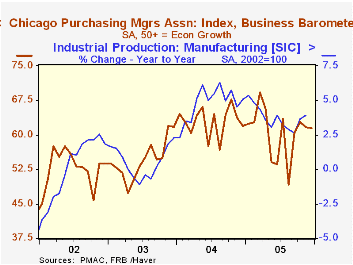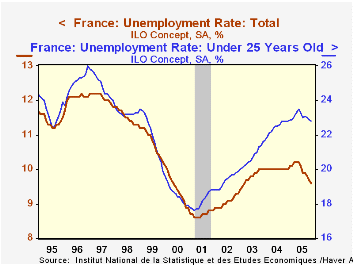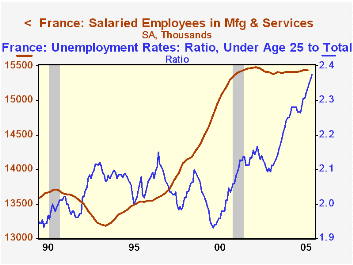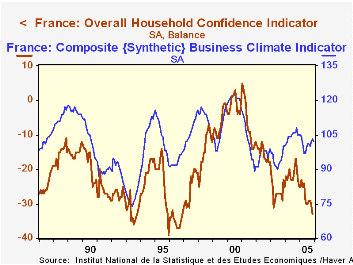 Global| Dec 30 2005
Global| Dec 30 2005Chicago PMI Steady
by:Tom Moeller
|in:Economy in Brief
Summary
The Chicago Purchasing Managers Business Barometer held at 61.5 in December versus an unrevised 61.7 in November. Consensus expectations had been for an easing to 60. For the year, the reading of 60.6 was slightly below the 2004 level [...]

The Chicago Purchasing Managers Business Barometer held at 61.5 in December versus an unrevised 61.7 in November. Consensus expectations had been for an easing to 60. For the year, the reading of 60.6 was slightly below the 2004 level and consistent with the moderate slowdown in factory sector production to 3.5% growth through November and 4.8% during all of 2004.
During the last ten years there has been a 63% correlation between the level of the Chicago Business Barometer and y/y growth in factory production.
The new orders index surged at yearend and recovered about half the prior month's steep decline. The production index dipped slightly, offset by a modest gain in employment. During the last ten years there has been a 62% correlation between the level of the employment index and year to year growth in factory sector employment nationally.
Pricing power eased in December but just moderately from the near-record high in November. During the last ten years there has been a 79% correlation between the prices index and the y/y change in the core PPI for intermediate goods.
| Chicago Purchasing Managers Index, SA | Dec | Nov | Dec '04 | 2005 | 2004 | 2003 |
|---|---|---|---|---|---|---|
| Business Barometer | 61.5 | 61.7 | 61.9 | 60.6 | 62.9 | 54.6 |
| New Orders | 66.7 | 61.6 | 64.9 | 64.7 | 67.0 | 58.0 |
| Prices Paid | 83.8 | 94.1 | 84.4 | 71.1 | 80.1 | 55.8 |
by Carol Stone December 30, 2005

On this last business day of 2005, the French statistics compilers, the National Institute for Statistics and Economic Studies (INSEE) reported unemployment data for November. The rate fell to 9.6% from 9.7% in October, the fifth decrease in the last six months. This ought to be good news and is especially impressive as it indicates that unemployment at least did not suffer immediately from the widespread riots that took place in the nation in late October and early November.
At the same time, among the major world events of this past year, perhaps these riots were the most directly connected to economic conditions. As we have described here before -- in fact, on September 30, less than a month before the riots began -- unemployment is especially severe for French youth and their relative job market status has worsened. The first two rows of the table below show this easily. The overall unemployment rate is now at the lowest since March 2003, but the rate for would-be workers under age 25 is 22.8%, 2.6 percentage points higher its March 2003 value of 20.2%.
Part of the problem is that jobs are not increasing in France. A quick look at our table and the second graph shows that employment has been basically stagnant since the middle of 2001; over these last several years, the ratio of youth unemployment to the overall rate has climbed steeply, suggesting that older workers are holding jobs better than young people.
We wondered about the economic impact of the riots themselves, but much French data for these months is not yet available. Business and consumer surveys, however, hint at a differential influence. INSEE's household confidence survey "confidence indicator" dropped 3 points to -33 in November, its worst since November 1996, nine years ago. People seem most concerned about their finances, and actually less worried about unemployment, so this deterioration could result from energy prices more than social unrest. Even so, the response is pronounced. December data are due for release Thursday, January 5.
Business confidence has held up recently, though. The "Business Climate Indicator" is not at a high level, but it rose noticeably throughout the second half of 2005. French stock prices have also increased, including a rise this month to the highest monthly close since early 2001. Thus, business leaders and investors feel differently than consumers have about the present state of the French economy, and as shown in the chart of confidence indicators, such divergences are rare. The nation seems to face an uncertain course as 2006 begins.
| France: Selected Data | Dec 2005 | Nov 2005 | Oct 2005 | Sept 2005 | 2004 | 2003 | 2002 |
|---|---|---|---|---|---|---|---|
| Unemployment Rate (%) | 9.6 | 9.7 | 9.8 | 10.0 | 9.8 | 9.1 | |
| Under 25 Yrs | 22.8 | 22.9 | 23.0 | 22.4 | 20.7 | 19.3 | |
| Employment (000s) | 15,444 | 15,404 | 15,403 | 15,466 | |||
| Household Confidence Survey | -33 | -30 | -29 | -22 | -27 | -16 | |
| Financial Condition Past 12 Months | -26 | -25 | -22 | -16 | -15 | -11 | |
| Business Climate | 102 | 103 | 102 | 100 | 105 | 95 | 97 |
| Stock Price CAC 40, EOP | 4716.62 | 4567.41 | 4436.45 | 4600.02 | 3821.16 | 3557.90 | 3063.91 |
Tom Moeller
AuthorMore in Author Profile »Prior to joining Haver Analytics in 2000, Mr. Moeller worked as the Economist at Chancellor Capital Management from 1985 to 1999. There, he developed comprehensive economic forecasts and interpreted economic data for equity and fixed income portfolio managers. Also at Chancellor, Mr. Moeller worked as an equity analyst and was responsible for researching and rating companies in the economically sensitive automobile and housing industries for investment in Chancellor’s equity portfolio. Prior to joining Chancellor, Mr. Moeller was an Economist at Citibank from 1979 to 1984. He also analyzed pricing behavior in the metals industry for the Council on Wage and Price Stability in Washington, D.C. In 1999, Mr. Moeller received the award for most accurate forecast from the Forecasters' Club of New York. From 1990 to 1992 he was President of the New York Association for Business Economists. Mr. Moeller earned an M.B.A. in Finance from Fordham University, where he graduated in 1987. He holds a Bachelor of Arts in Economics from George Washington University.
More Economy in Brief
 Global| Feb 05 2026
Global| Feb 05 2026Charts of the Week: Balanced Policy, Resilient Data and AI Narratives
by:Andrew Cates






